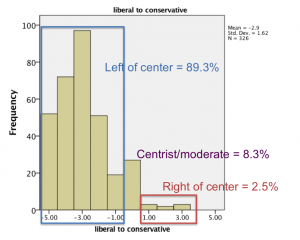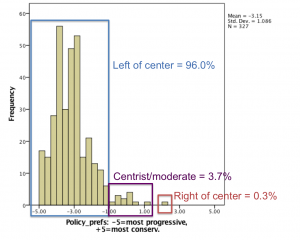New Study Indicates Existence of Eight Conservative Social Psychologists
最近研究显示:保守派社会心理学家现存8位
Just how much viewpoint diversity do we have in social psychology? In 2011 nobody knew, so I asked 30 of my friends in the field to name a conservative. They came up with several names, but only one suspect admitted, under gentle interrogation, to being right of center.
社会心理学领域到底有多大的观点多样性?2011年时还没人知道,所以我询问了30个该领域的朋友,让他们举出一位保守派。结果他们提到了好几个名字,但在温和的盘问之下,只有一位嫌疑人承认了自己的政治倾向是中间偏右的。
A few months later I gave a talk at the annual convention of the Society for Personality and Social Psychology in which I pointed out the field’s political imbalance and why this was a threat to the quality of our research.
几个月后,我在人格与社会心理学协会(SPSP)年会上发言时,指出了该领域的政治失衡现象,以及为什么这种现象会对我们的研究质量造成威胁。
I asked the thousand-or-so people in the audience to declare their politics with a show of hands, and I estimated that roughly 80% self-identified as “liberal or left of center,” 2% (I counted exactly 20 hands) identified as “centrist or moderate,” 1% (12 hands) identified as libertarian, and, rounding to the nearest integer, zero percent (3 hands) identified as “conservative or right of center.” That gives us a left: right ratio of 266 to one. I didn’t think the real ratio was that high; I knew that some conservatives in the audience were probably afraid to raise their hands.
我要求在场的约一千名听众举手表明自己的政治倾向,估计大略有80%的人认为自己是“自由派或者中间偏左派”,有2%(我数下来不多不少20个人)认为自己是“中立派或者温和派”,只有1%(12个人)自认自由意志主义者,如果直接取整的话,几乎0%(3个人)自认“保守派或者中间偏右派”。我们看到的是一个266:1的左右派比值。我不认为真实的比值会如此之高,我知道当时听众席里有些保守派可能会怯于举手。
Some of my colleagues questioned the validity of such a simple and public method, but Yoel Inbar and Yoris Lammers conducted a more thorough and anonymous survey of the SPSP email list later that year, and they too found a very lopsided political ratio: 85% of the 291 respondents self-identified as liberal overall, and only 6% identified as conservative.
有些同事对我这种简易公开方式的有效性提出了质疑。但是,同年晚些时候,Yoel Inbar 和 Yoris Lammers在该协会邮件组中进行了一场更加彻底的匿名调查,结果他们也发现了一边倒的政见比值:总共291个调查对象中,有85%认为自己基本可以算作自由派,而只有6%的调查对象认为自己是保守派。
That gives us our first good estimate of the left-right ratio in social psychology: fourteen to one. It’s a much more valid method than my “show of hands” (which was intended as a rhetorical device, not a real study). But still, we need more data, and we need to try more ways of asking the questions.
这就给我们提供了社会心理学界中左右派比值的第一份合理估计:14:1。这就比我之前的“举手”办法要可靠多了(当时我只是为了表明观点,并非真正的学术研究)。但是话说回来,我们还是需要更多的数据,而且需要尝试更多的调查途径。
A new data set has come in. Bill von Hippel and David Buss surveyed the membership of the Society for Experimental Social Psychology. That’s a professional society composed of the most active researchers in the field who are at least five years post-PhD. It’s very selective – you must be nominated by a current member and approved by a committee before you can join.
现在我们有了一组新数据。Bill von Hippel和David Buss调查了实验社会心理学会(SESP)的全体会员。这是个由该领域最活跃的研究者组成的专业协会,全体成员都至少已博士毕业5年。他们都是经过精挑细选的,入会必须获得会员提名且通过一个委员会的批准。
Von Hippel and Buss sent a web survey to the 900 members of SESP and got a response rate of 37% (335 responses). So this is a good sample of the mid-level and senior people (average age 51) who produce most of the research in social psychology.
Von Hippel和Buss向该学会的900名会员发送了网上调查问卷,回应率为37%(共335个回应者)。所以,对于在社会心理学领域贡献了绝大部分研究的中高级人员(平均年龄51岁)而言,这是一个很不错的样本。
Von Hippel and Buss were surveying the members’ views about evolution, to try to understand the reasons why many social psychologists distrust or dislike evolutionary psychology. At the end of the survey, they happened to include a very good set of measures of political identity. Not just self-descriptions, but also whom the person voted for in the 2012 US Presidential election. And they asked nine questions about politically valenced policy questions, such as “Do you support gun control?” “Do you support gay marriage?” and “Do you support a woman’s right to get an abortion?”
Von Hippel和Buss的问卷要调查的是会员们对进化问题的观点,试图了解许多社会心理学家怀疑或厌恶进化心理学的原因。在问卷最后一部分,他们碰巧设置了一组很棒的政治认同鉴别方法。不仅仅包括自我描述,而且还问到了他们在2012年美国大选中的投票对象。此外他们还提出了9个已成为政治心理价(valence)的政策问题【编注:心理价(valence)是指那些会恒常的引发正面或负面情绪的东西、事情或特征】,比如“你是否支持枪支管制”,“你是否支持同性婚姻”和“你是否支持妇女堕胎权”等等。
In a demonstration of the new openness and transparency that is spreading in social psychology, Von Hippel and Buss sent their raw data file and a summary report to all the members of SESP, to thank us for our participation in the survey. They noted that their preliminary analysis showed a massive leftward tilt in the field – only four had voted for Romney.
Von Hippel和Buss体现了新近在社会心理学界蔚然成风的公开透明精神,将他们的原始数据文件和总结报告发送给了SESP的全体会员,以感谢我们在这场调查研究中的积极参与。他们指出,他们的初步分析显示出了该领域严重左倾的现象——只有四个人曾给罗姆尼投过票。
I then emailed them and asked if I could write up further analyses of the political questions and post them at Heterodox Academy. They generously said yes, and then went ahead and made all the relevant files available to the world at the Open Science Framework (you can download them all here).
而后我通过电邮联系了他们,问我能不能就这些政治问题写个深度分析并发到异端学院(Heterodox Academy)网站上。他们很大方地同意了,紧接着就把相关文件发到开放科学框架网(Open Science Framework)上并开放了下载(你们可以在这个网站下载全部资料https://osf.io/ebvtq/)。
So here are the results, on the political distribution only. (Von Hippel and Buss will publish a very interesting paper on their main findings about evolution and morality in a few months). There are three ways we can graph the data, based on three ways that participants revealed their political orientation.
下面就是仅涉及政见分布问题的成果了。(Von Hippel和Buss将会在几个月后发表一篇非常有意思的论文,主题是他们在进化和道德方面的主要发现。)依照参与者透露他们政治倾向的三种途径,我们也可以通过三种方式来将数据图表化。
1)Self-descriptions of political identity: 36 to one.
1)自我描述的政治认同:36:1。
One item asked “Where would you put yourself on a continuum from liberal to conservative?” The 11 scale points were labeled “very liberal” on the left-most point and “very conservative” on the right-most point. If we do a simple frequency plot (a graph of how many people chose each of the 11 possible responses) we get the following:
有一道题问到:“在自由派和保守派之间这个连续区间内,你会将自己定位于何处?”在这11个选项中,最左端的那个被标为“极端自由派”,最右端则为“极端保守派”。如果我们绘制一个频率分布直方图(一个体现11个选项对应人数的图表),则得下图:
【图表一:政治倾向自评分】
The graph shows that 291 of the 326 people who responded to this question picked a left-of-center label (that’s 89.3%), and only 8 people (2.5%) picked a right of center label, giving us a Left to Right ratio of 36 to one. This is much higher than that found by Inbar and Lammers. The main source of political diversity appears to be the 27 people (including me) who self-identified as centrists.
图表显示,该题的326位回答者中有291位选择了中间偏左标签(占总数89.3%),而只有8位选择了中间偏右标签(占总数2.5%),这就得出了一个36:1的左右派比值。这比Inbar和Lammers发现的比值还高。政治多样性主要基于27位自我定义为中间派的回答者(包括本人在内)。
2)Presidential voting: 76 to one.
2)总统选举投票:76:1。
Another item asked: “Who did you vote for in the last presidential election (if you are not a US citizen, or if you did not vote, who would you have voted for if you had voted)? The options were: “Obama,” “Romney,” or “Other.” If we do a frequency plot of the 3 possible choices we get this:
另有一道题问到:“在上次总统大选中你把选票投给了谁(如果你不是美国公民,或者你并未投票的话,假设让你投票,你可能会投给谁)?”选项有这么几个:“奥巴马”、“罗姆尼”或“其他”。如果我们依照这三个选项绘制频率分布直方图,则得下图:
【图表二:2012年美国总统大选】
The graph shows that 305 of the 322 people (94.7%) who responded to this question voted for Obama, 4 (1.2%) voted for Romney, and 13 (4.0%) said they voted for another candidate. This gives us a Democrat to Republican ratio of 76 to one.
图表显示,该题的322位回答者中有305位(占94.7%)投给了奥巴马,4位(占1.2%)投给了罗姆尼,而有13位(占4.0%)回答者投给了其他总统候选人。这就得出了一个76:1的“驴象比”比值。
3)Views on political issues: 314 to one.
3)政治议题上的观点:314:1。
A third way of graphing the viewpoint diversity of these senior social psychologists is by computing an average score across all 9 of the politically valenced policy items. For each one, the 11 point response scale was labeled “strongly oppose” on the left-most point and “strongly support” on the right-most point.
将这些资深社会心理学家的观点多元状况图表化的第三条途径,就是算出他们在九道政治心理价问题上的平均得分。每个问题的答案选项都有11个,最左端的为“强烈反对”,最右端为“强烈支持”。
I converted all responses to the same 11 point scale used in figure 1 so that “strongly supporting” the progressive position (e.g., pro-choice) was scored as -5 and “strongly supporting” the conservative position (e.g., prayer in school) was scored as +5. That puts the leftists on the left and the rightists on the right of the graph. Here’s the graph:
我将所有回答都转换成与图表1中的11个选项一一对应,也就是说,“强烈支持”进步派立场的(比如主张堕胎权)就会被记作-5分,而“强烈支持”保守派立场(比如支持校内祷告)就会被记作5分。这样就可以在图表上把左派标到左侧,右派标到右侧。图表如下:
【图表三:对九个政治议题的观点】
I counted anyone whose average score fell between -1.0 and +1.0 (inclusive) as a centrist. The graph shows that 314 of the 327 participants (96.0%) had an average score below -1.0 (i.e., left of center), one had an average score above +1.0 (i.e., right of center), and 12 were centrists. That gives us a Left to Right ratio of 314 to one.
我将所有平均得分在-1.0与1.0之间的参与者都算作中间派。图表显示,在327名参与者中有314位(占96.0%)的平均得分低于-1.0(即中间偏左),只有一位参与者的平均得分高于1.0(即中间偏右),另外还有12位是中间派。这样我们就得出了一个314:1的左右派比值。
What does this mean?
这意味着什么?
However you measure it, and for all samples measured so far, social psychology leans heavily to the left and has very few people right of center. Von Hippel and Buss’s new data confirms the story that a few of us told in a recent paper (Duarte, Crawford, Stern, Haidt, Jussim & Tetlock, 2015) in which we created the graph below, which shows just how fast psychology has been moving to the left since the 1990s. The ratio of Democrats to Republicans (diamonds) and liberals to conservatives (circles) was roughly 3 to 1 for most of the 20th century. But it skyrockets beginning in the 1990s as the Greatest Generation retires and the Baby Boomers take over.
不论你如何衡量,就目前已经测得的样本来看,社会心理学界已经左倾得非常严重了,只有很少人是中间偏右的。Von Hippel和Buss的新数据也证实了我们几个在最近的一篇论文(Duarte, Crawford, Stern, Haidt, Jussim和Tetlock于2015年发表)里说到的情况,文中我们绘制了下面这张图表,它显示了从1990年代起心理学界是以何等之快的速度左倾化的。“驴象比”(在图中以方块示出)和“左右比”(在图中以圆圈示出)比值在上个世纪基本为3:1。但随着“最伟大世代”【编注:作家Tom Brokaw将成长于大萧条年代,接着参加二战,随后又经历了战后大繁荣的那一代人称为最伟大一代】的退休和婴儿潮一代的接班,这个比值在90年代开始直线窜升。
【图表四: 1920年代起学院心理学家左右派比值的攀升。(详见Duarte等人在2015年发表的论文)】
Why does this matter?
这为什么重要?
Most people know that professors in America, and in most countries, generally vote for left-leaning parties and policies. But few people realize just how fast things have changed since the 1990s. An academic field that leans left (or right) can still function, as long as ideological claims or politically motivated research is sure to be challenged. But when a field goes from leaning left to being entirely on the left, the normal safeguards of peer review and institutionalized disconfirmation break down. Research on politically controversial topics becomes unreliable because politically favored conclusions receive less-than-normal scrutiny while politically incorrect findings must scale mountains of motivated and hostile reasoning from reviewers and editors.
美国以及大多数国家的教授们一般都会支持左翼政党或政策,这没什么新鲜,但鲜为人知的是, 1990年代以来事态是以何其快的速度转变着。只要意识形态主张或者出于政治目的的研究仍必然会遭到挑战,那么一个左倾(或右倾)的学术领域就还能运转。但是当一个学术领域从左倾发展到铁板一块的左翼时,同行评议或者体制化否证的正常保障监督措施就会崩溃。对在政治上有争议的论题的研究会变得不再可靠,因为存在政治偏袒的结论现在受到的审查少之又少,而政治不正确的发现则需要排除万难,须要遭受评议人和编辑们发出的种种带有政治动机和敌意的论证。
I consider the rapid loss of political diversity, over the last 20 years, to be the second-greatest existential threat to the field of social psychology, after the “replication crisis.” The field is responding constructively to the replication crisis. Will it also attend to its political diversity crisis? Or will it continue to think of diversity only in terms of the demographic categories that most matter to people on the left: race, gender and sexual orientation?
我将过去二十年间发生的这次政见多样性的迅速退减视为,社会心理学领域的第二大致命威胁,仅次于“可重复性危机”。这个领域正在积极地应对可重复性危机,那么它也会去解决它的政见多样性危机吗?还是说,它仍旧只会从人口统计学这个对左派人士来说至关重要的角度来考虑多样性?只会考虑种族、性别和性向问题?
I don’t mean to single out social psychology. It is the field that I know best, but what we have learned at Heterodox Academy is that this problem, this rapid shift to political purity, has happened to most fields in the humanities and social sciences in just the last 2 decades.
我并不是故意要把社会心理学挑出来。这只是我最熟悉的领域,但我们在异端学院意识到了:这个问题,即政治单一化现象,仅在过去的短短20年内就在大部分人文社科领域都已经发生了。
An optimistic ending
一个乐观的结局
I would like to end by thanking my colleagues. I have been raising a fuss about these issues since 2011. In that time I also moved from the left to the center, politically. I am no longer a progressive. So you might expect that I’ve been ostracized, but I have not. Nothing bad has happened to me.
我想以我对同事们的感激来结尾。从2011年开始我就因为这些事搞得他们鸡犬不宁,那时候我也在政治倾向方面由左派转变为中间派。我不再是个进步主义者了。所以你可能以为我已经被排挤了,但是并没有,万事顺遂。
Some of my colleagues believe that the political imbalance is not a problem. But the majority response has been, roughly: “This is really interesting. We really truly value diversity, and we agree with you and your co-authors that diversity of viewpoints is the kind that confers the most benefits on groups. But gosh, how are we going to get more?”
我的有些同事觉得政见失衡没什么大不了的。但大多数回答大概是这样的:“这确实挺有意思的。我们的确很看重多样性,而且我们同意你和你的合著者的观点,观点多样性是那种可以为团体带来最大益处的东西。但是啊,我们怎么才能获取更多多样性呢?”
That’s our mission at Heterodox Academy – to figure out how to get more. It will be hard, but it can and must be done. Please see our “solutions page.”
这就是我们在异端学院中的使命了,那就是搞清楚如何能获得更多的多样性。道路是曲折的,但前途是光明的。请参看我们的“方案页”。
Post script: Paul Krugman recently referred to us at Heterodox Academy as “outraged conservatives,” and he said that the leftward shift in the academy was really just the rightward shift of the Republican Party since the 1990s. He suggests that professors didn’t change their views on policy, they just stopped identifying as Republicans as the party went off the deep end.
附:Paul Krugman最近将我们这些异端学院上的人称为“愤怒的保守派”,他说1990年代以来学界的左转其实只是共和党的右转。他的言下之意是,教授们并没有改变过他们的政见,他们只是在共和党转入极端时不再自我标榜为共和派了而已。
There is surely some truth to Krugman’s argument, but that doesn’t negate our claim that the makeup of the professoriate really did change after the Greatest Generation retired. Krugman’s argument could not explain graph #3, for example, which shows just a single person with views on social issues that are right of center. Also, I should point out that most of us at Heterodox Academy are not conservatives, and if you read everything on our site, it will be hard to find evidence of “outrage.”
Krugman的质疑确实反映了部分事实,但这并没有驳倒我们的主张,最伟大世代逝去之后教授阶层的组成结构确实发生了变化。比如,Krugman的质疑就没能解释图表三里只有一个人对偏右社会事件支持的现象。此外,我必须要指出,异端学院上的大多数人都不是保守派,而且如果读过我们网站上的所有文章的话,你会很难发现有“愤怒”的踪迹。
翻译:Marcel ZHANG(@马赫塞勒张)
校对:沈沉(@你在何地-sxy)
编辑:辉格@whigzhou



